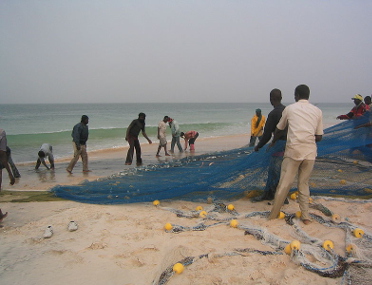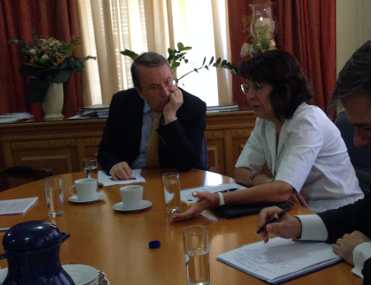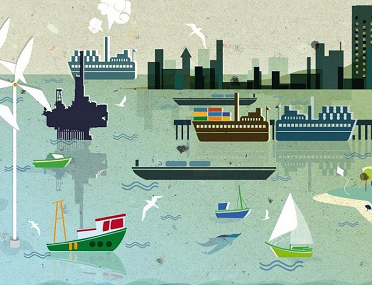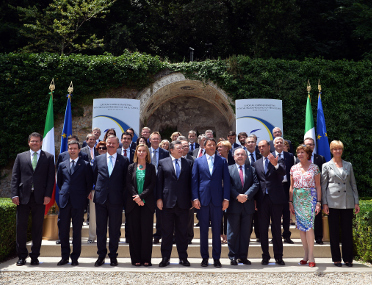Press releases
Fisheries

Part of EU fleet can continue fishing in Mauritanian waters until end of 2014
30/07/2014
EU vessels fishing shrimps and small pelagics in Mauritanian waters in the framework of the EU-Mauritania Fisheries Protocol will be able to continue to do so until 15 December 2014. This is part of the compromise which EU negotiators found last night in Nouakchott after the Mauritanian authorities had upheld the position that all EU vessels would have to leave Mauritanian waters as of 1 August 2014. According to the agreement found, Mauritania accepted EU fishing activities for a period of 24 months as part of the bilateral Fisheries Protocol, hence the shrimps and small pelagics fisheries which started in January 2013 can continue, whereas those EU vessels which had been fishing tuna and demersals since August 2012 during a transitional period will need to leave Mauritanian waters today. Furthermore, the EU and Mauritania agreed to continue the discussions for a renewed Fisheries Protocol so to allow the full EU fleet to resume their activities soon.

Commissioner Damanaki takes an initiative to reenergise the Pelagos Sanctuary
29/07/2014
“The Pelagos Sanctuary is the biggest protected area in the Mediterranean”, said Commissioner Damanaki “and it holds great potential as a best practice example of how sustainable blue growth can work in busy and densely populated areas, while protecting marine life, including fish. We need to discuss how the EU's Common Fisheries Policy and Integrated Maritime Policy can ensure the Pelagos Sanctuary is operational and to support blue growth in the region. I intend to work in this direction in the coming weeks with the three key countries of the Pelagos Sanctuary as well as with the stakeholders of the region.”
Commissioner Damanaki has taken the initiative to reenergise the Pelagos Sanctuary and sought to bring together France, Italy and the Principality of Monaco, the key countries of the Pelagos Sanctuary and the stakeholders, to discuss how the EU's policy tools, including the possibility of financial support from the European Maritime and Fisheries Fund (EMFF), can be used to facilitate such policies.

Story of the week - "Pisces: connecting responsible fishermen with responsible fish restaurants"
28/07/2014
This week's story on sustainability will take you through a responsible restaurant-led initiative in the UK, involving fishermen, chefs and consumers. Pisces is the experience of connecting fishermen to their restaurant customers and providing fresh, high quality sustainable seafood.
Since 2004, Pisces gathers boats selected for the quality of their catches but also the sustainability of their practices and helps these boats source restaurants. The initiative links responsible fishermen with responsible chefs.
Find more about Pisces Responsible Fish Restaurants initiative by watching Malcolm MacGarvin's video here, in which Pisces' co-founder explains the aim of this sustainable initiative and what sustainable fisheries means for him. for further information, you can visit Pisces' webpage.

EU Socialist leaders discussed upcoming political priorities
17/07/2014
Commissioner Damanaki participated on July 16th to the meeting of EU Socialist leaders which took place ahead of the European Council. Together, EU socialist leaders prepared the discussions on upcoming political priorities as well as on the nomination of key European institutional positions.

EU and Guinea Bissau agree to re-activate fisheries cooperation
16/07/2014
Commissioner Damanaki today met with the newly appointed Prime Minister from Guinea Bissau, Mr Domingos Simões Pereira, and the country's Secretary of State for Fisheries, Mr Idelfonso de Barros.
Prime Minister Simões Pereira took office on 4th July following the legislative and presidential elections of April/May 2014. These elections were a major step to the restoration of constitutional order in the country and towards political stability.
Commissioner Damanaki and Prime Minister Simões Pereira discussed the bilateral and strategic cooperation in fisheries matters between the EU and Guinea Bissau. They agreed to re-activate the ratification procedure of the Fisheries Partnership Agreement between the EU and Guinea Bissau: a three-year protocol was negotiated in 2012 but never entered in to force due to the political situation in the country.
Other topics of mutual interest were evoked during this meeting, notably the need to enhance cooperation in the fight against illegal fishing, in matters of transparency and to ensure proper implementation of the EU’s support to the fisheries sector in Guinea Bissau.
Fisheries are an important activity for Guinea Bissau and EU fishermen have an interest in fishing tuna, shrimps, cephalopods and demersals along the coast of the country.

EU-Morocco Fisheries Partnership Agreement to enter into force
15/07/2014
The European Commission welcomes Morocco’s ratification of a Fisheries Protocol which is set to open the door for European vessels to go back fishing in Moroccan waters after a pause of more than two years. The European Union and Morocco had concluded the 4-year fisheries deal in December 2013, however its entry into force was pending ratification by Morocco. Now that both sides have concluded their ratification procedure, EU vessels will receive certain fishing rights in Moroccan waters in return for financial assistance by the EU to develop the Moroccan fishery sector. The protocol is the second most important of its kind and belongs to a new generation of fisheries agreements after the reform of the EU Common Fisheries Policy, placing a strong emphasis on environmental sustainability, economic profitability and international legality.
Commissioner Damanaki said on this occasion: "I am glad that this protocol can finally enter into force: our fishermen have been waiting for this day for more than two years. Now we need to make sure that our fleet can resume its activities as soon as possible. This new protocol is an example for responsible international fisheries governance: we made sure that the EU’s fishing rights do not exceed the scientifically sound limit that ensures sustainable fisheries, and that European vessels do not compete with local fishermen. I am confident that the EU’s financial support will help build a sustainable future for Moroccan fisheries through the targeted sectoral support.”
Details of the protocol
Up to 120 vessels from 11 EU countries (Spain, Portugal, Italy, France, Germany, Lithuania, Latvia, Netherlands, Ireland, Poland and United Kingdom) are concerned by the new protocol. The fishing possibilities have been increased by a third compared to the previous protocol and will now total 80,000 tonnes for small pelagic species with further fishing opportunities available for demersal, tuna and artisanal fisheries. In total, 6 fishing categories exploited by both industrial and small-scale fleet segments are covered by the protocol.
The cost for the EU taxpayer for accessing these increased possibilities has decreased by 30% compared to the former protocol. The total cost to the EU will be €30 million a year, of which €16 million compensates Morocco for access to the resource and €14 million is directed towards supporting the fisheries sector in the country. In addition, the ship owners' contribution is estimated at €10 million, giving a total financial envelope for Morocco of an estimated €40 million, whilst the new Protocol also provides for increased job opportunities for Moroccan fishermen.
A human rights clause is included in the Protocol and, as with all of the EU's agreements, an in-built suspension mechanism ensures that the EU can unilaterally suspend the protocol in case of human rights violations. Detailed and regular reporting obligations for Morocco will help to demonstrate the economic and social impact of the sectoral support on the local populations. This reporting mechanism will include details on how each sectoral support project serves the best interests of all of the local population on a geographical basis.
The last protocol under the fisheries agreement with Morocco was terminated in December 2011. Following a lengthy negotiation process, a new protocol approved by the European Parliament and Council of Ministers was signed at the end of 2013. The entry into force has been delayed until now, pending ratification of the protocol by Morocco.
Find further information on the EU’ fisheries partnership agreements.

Agriculture and Fisheries Council discusses Fishing Opportunities for 2015
14/07/2014
The Agriculture and Fisheries Council meeting of July 2014 took place in Brussels on July 14th.
Commissioner Damanaki came back during the press conference on the discussions on fishing opportunities for 2015. The Commission presented its communication on the preparation of setting next years' fish quotas, adopted on 26 June. The Commission also reported on the state of fish stocks in EU waters. While in the North and West of Europe, overfishing has fallen from 86% of the stocks in 2009 to 41% in 2014, there are still serious problems of overfishing in the Mediterranean Sea with 96% or more of the Mediterranean bottom-living fish being overfished.
The annual report marks the beginning of a wide consultation exercise and Commissioner Damanaki looks forward to hearing the input and views from ministers, which will then be taken into account in the preparation of the Commission's forthcoming proposals for fishing opportunities for 2015. In line with the reformed Common Fisheries Policy, the Commission's proposals are based on the objective of achieving Maximum Sustainable Yield (MSY) fishing by 2015, multiannual plans, as well as any impact from the landing obligation. The proposals will be discussed during Councils in the autumn - political agreement is expected for the Baltic Sea (October), deep-sea (November), Black Sea and Atlantic/North Sea (December).

Meeting in the margins of the Agrifish Council with Spanish Minister Garcia Tejerina
14/07/2014
Commissioner Damanaki today met, in the margins of the Agriculture and Fisheries Council in Brussels, with the newly-appointed Spanish Minister for Agriculture, Food and the Environment, Ms Isabel Garcia Tejerina. Together they discussed the positive outcome and progresses made in the Atlantic and shared concerns over the state of the Mediterranean, both agreeing on the need for further action in this sea-basin. Minister Garcia Tejerina underlined that Spain will continue to work on the same path, towards sustainability.

Meeting with newly-appointed Greek Fisheries Minister Mr Karasmanis
11/07/2014
Commissioner Damanaki held an initial informational meeting today with the newly-appointed Greek Minister, Mr Georgios Karasmanis responsible for fisheries, in view of the new programming period 2014-2020 .
Maritime affairs

Commission welcomes Council's agreement to improve how seas and coastal areas are used
23/07/2014
The EU's General Affairs Council has adopted legislation to improve the planning of maritime activities. The new Maritime Spatial Planning Directive will help Member States develop and coordinate various activities taking place at sea so that they are as efficient and sustainable as possible.
Commissioner Damanaki welcomed the Council's green light by stating: "We want to make the growth of maritime sectors both smart and sustainable. The Directive reconciles the diverse uses of the sea and will make access to maritime space more predictable. This will help avoid potential conflicts between users, so that businesses can enjoy a more stable and assured environment, and so that we can better manage the impact of human activities on the marine environment." Commissioner for the Environment Janez Potočnik added: "This is a good example of how economic development and safeguarding the environment can go hand in hand. Good planning means a win on both counts."
The Directive is a cornerstone in the EU's Blue Growth strategy, allowing more efficient implementation of EU legislation for both economic and environmental gain. With Maritime Spatial Planning, operators and developers will have greater certainty about their investments and should also see a reduction in red tape.
Each relevant EU Member State must now transpose the Directive into their national legislation and to nominate a Competent Authority in charge of its implementation by September 2016.
Although national maritime spatial plans must comply with a number of minimum requirements set by the Directive, countries are free to tailor the content of the plans to their specific economic, social and environmental priorities, as well as to their cultural traditions and legal context.
Read more questions and answers here as well as Commissioner Damanaki's blog on Maritime Spatial Planning.

Maritime surveillance: Joining forces with Member States for safer seas and oceans
08/07/2014
The European Commission today took a further step towards more effective and cost-efficient surveillance of European Seas. By bringing together surveillance data from civil and military authorities like coast guards, navies, traffic monitoring, environmental and pollution monitoring, fisheries and border control, duplication of work can be avoided and savings of up to €400 million per year can be made. Increased cooperation and sharing of data would help cope more efficiently with real time events at sea such as accidents, pollution incidents, crime or security threats. CISE, the Common Information Sharing Environment for the maritime domain, aims at making all the relevant actors come together and share data. CISE is one of the building blocks of the recently adopted European Maritime Security Strategy.
Today's Communication by the Commission presents the good progress made at EU and national level since the CISE roadmap was elaborated in 2010 and the strong commitment of all actors in this field. It also proposes guidance and priorities for further action both at national and EU levels. Main focus should be to further enhance information exchange – in particular between civil and military authorities, to better interconnect existing maritime surveillance systems and make them inter-operational. This will bring increased efficiency, quality, responsiveness and co-ordination of maritime surveillance operations in EU waters as well as any other geographical area where the EU has a vital interest. It will help create a safer investment climate for blue growth and enhance the prosperity and security of EU citizens.
Commissioner Damanaki said: “Sustainable economic growth within the maritime sector can only be ensured if our seas and oceans are safe and secure. CISE aims to make sure that all involved maritime surveillance actors have a complete picture of all events at sea. Sharing such information is key to avoid duplication in collection of data and for the use of patrol ships, planes, helicopters or satellites in the same sea areas. Today, about 40% of information is collected several times and 40% to 80% of information is not shared amongst the interested users. We cannot afford such a waste of efforts and money".
In the near future, the Commission intends to launch a project under the EU's 7th Framework Programme for Research in order to test Maritime CISE on a large scale. It will also produce a handbook, together with Member States, on best practice recommendations on how to apply CISE based on experience from existing systems and pilot projects like MARSUNO, Bluemassmed and Cooperation. The Commission will also continue to support measures to develop standards to allow inter-operability between systems.
Read the Questions & Answers here and find further information as well as the Communication here.

Official visit of the College of Commissioners to Rome
04/07/2014
On July 3d and 4th the College of Commissioner payid an official visit to Rome for the launch of the Italian Presidency of the Council of the EU. During a two-days programme and together with the Italian government, the Commissioners exchanged views on the priorities of the upcoming Presidency and their implementation.


